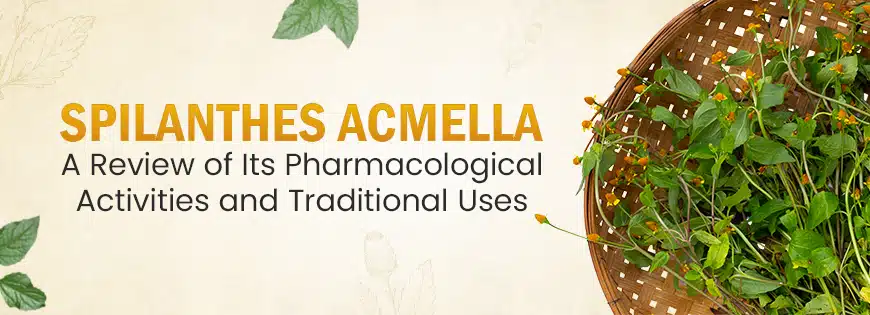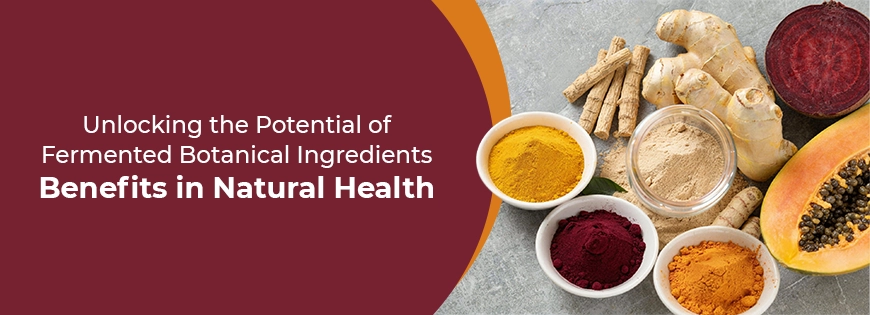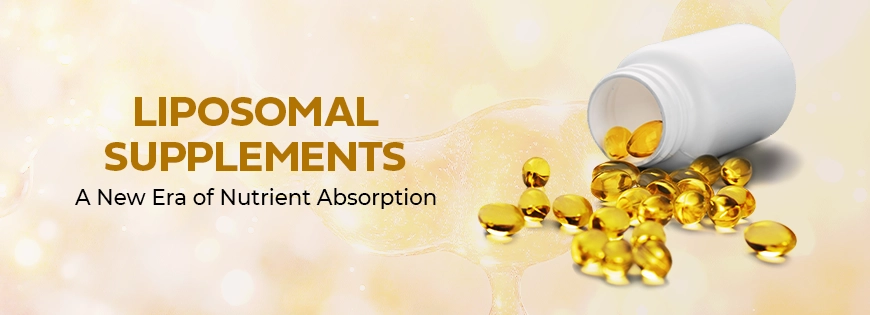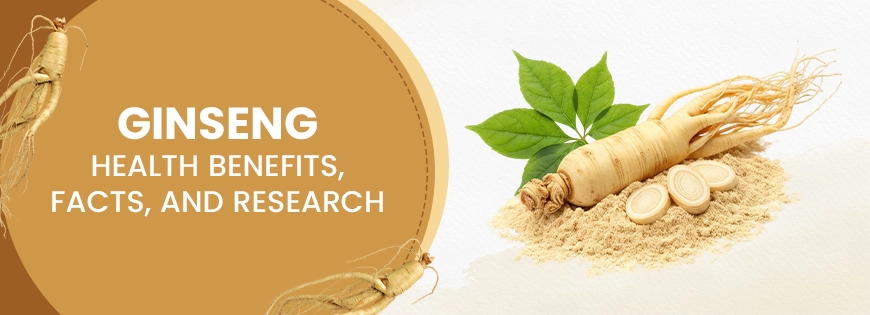Spilanthes acmella, commonly known as the toothache plant, paracress, or eyeball plant, is a significant medicinal herb belonging to the Asteraceae family. This plant has been widely used in traditional medicine across various cultures, particularly in tropical and subtropical regions, for its diverse pharmacological properties. The primary bioactive compound in Spilanthes acmella is spilanthol, an alkamide found in its roots, leaves, and flowers, which contributes to its antiseptic, anti-inflammatory, and analgesic effects.
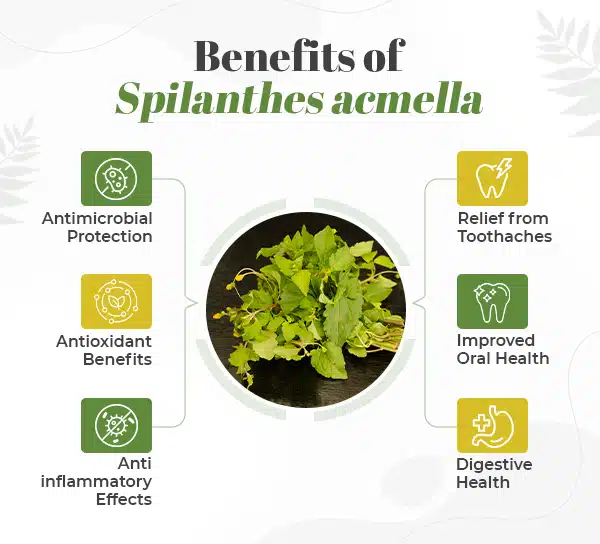
Introduction to Spilanthes acmella
Spilanthes acmella is an annual herb that grows up to 32-60 cm in height, characterized by its broad leaves and distinctive gold and red flowers. It is often referred to as “nature’s toothbrush” due to its ability to stimulate oral health by providing a tingling sensation in the mouth and gums. The plant’s unique properties have made it a valuable resource in traditional medicine for treating various health issues, including toothaches, mouth ulcers, and digestive problems.
Traditional Uses of Spilanthes Acmella
Traditionally, Spilanthes acmella has been used for multiple purposes across different cultures:
- Toothache Relief: The fresh flower heads and leaves are chewed or placed in tooth cavities to relieve pain due to their analgesic properties.
- Oral Health: It is used to treat mouth ulcers, stomatitis, and gum infections due to its antiseptic and anti-inflammatory effects.
- Digestive Issues: The plant may help improve digestion and reduce symptoms of candida, thrush, and herpes.
- Skin Conditions: It is used to treat fungal skin diseases and as a remedy in some traditional practices.
Also Read: The Powerful Anti-Aging Benefits of Spilanthol
Pharmacological Activities of Spilanthes acmella
The pharmacological activities of Spilanthes acmella are diverse and well-documented:
1. Antimicrobial Properties: The plant exhibits antiseptic, antibacterial, and antifungal properties, making it effective against infections.
An in-vitro study assessed the antibacterial activity of Spilanthes acmella ethanol extract against bacteria causing dental caries and periodontal disease. Results showed concentration-dependent bacterial inhibition, with the highest effect at 100 mg/ml. Findings support the traditional use of S. acmella as a potential natural antimicrobial agent in dental care.
2. Anti-inflammatory Effects: It may help reduce inflammation, which is beneficial for conditions like rheumatism and skin diseases.
A review highlights the antioxidant and anti-inflammatory properties of Spilanthes acmella, attributed to its bioactive compounds like flavonoids, phenolics, and alkamides. Experimental studies show its potential in modulating oxidative stress and inflammatory pathways (e.g., iNOS, NF-κB, COX-2, MAPK), suggesting its therapeutic value in preventing diseases linked to inflammation and oxidative damage.
3. Antioxidant Activity: Spilanthes acmella possesses antioxidant properties, which can protect against oxidative stress and related diseases.
In a 2008 animal study published in the International Journal of Molecular Sciences (Wongsawatkul et al., 2008), researchers investigated the vasorelaxant and antioxidant effects of various solvent extracts of Spilanthes acmella. Using isolated rat thoracic aorta, they found that all extracts induced dose-dependent vasorelaxation, partly mediated by nitric oxide (NO) and prostacyclin (PGI₂) from endothelial cells.
Also Read: Fenugreek and Its Effects on Muscle Performance
The ethyl acetate extract was the most potent vasorelaxant (ED₅₀ = 76.1 ng/mL) and showed strong radical scavenging activity in DPPH assays. The chloroform extract displayed the highest SOD antioxidant activity. The findings suggest Spilanthes may serve as a natural source of vasodilators and antioxidants.
4. Local Anesthetic: The spilanthol in the plant acts as a local anesthetic, providing relief from toothaches and other pain.
In an animal study published in the Indian Journal of Pharmacology (2010), aqueous extract of Spilanthes acmella (SAM) demonstrated significant local anesthetic and antipyretic effects. In guinea pigs, 10% and 20% SAM produced 70.36% and 87.02% anesthesia, respectively, compared to 97.22% by 2% xylocaine.
In frogs, SAM induced anesthesia in 5.33 minutes, lasting up to 30 minutes. In rats with yeast-induced fever, SAM doses of 100–400 mg/kg significantly reduced elevated body temperature within the first 3 hours, showing a dose-dependent response. The study suggests that SAM may be a promising natural remedy for pain and fever management.
5. Immunomodulatory Effects: It may support immune function, helping the body fight off infections more effectively.
In an animal study titled “Antioxidant and immunomodulatory properties of Spilanthes oleracea with potential effect in chronic fatigue syndrome infirmity” (Journal of Ayurveda and Integrative Medicine, 2020), researchers evaluated the effects of Spilanthes flower extract on mice subjected to chronic fatigue syndrome (CFS) using a water-immersion stress model.
The results showed that Spilanthes significantly reduced immobility time and increased tail withdrawal latency, indicating anti-fatigue effects. Biochemical tests revealed a reduction in lipid peroxidation and nitrite levels, along with an increase in catalase activity. Spilanthes also improved humoral and cellular immune responses, highlighting its antioxidant and immunomodulatory potential against CFS.
Benefits of Spilanthes acmella
Here are some of the potential benefits of Spilanthes:
- Relief from Toothaches: The plant’s analgesic properties can help alleviate toothache pain by numbing the area.
- Improved Oral Health: It may help prevent mouth ulcers, gum infections, and other oral health issues due to its antiseptic properties.
- Digestive Health: Spilanthes might improve digestion and reduce symptoms of digestive disorders.
- Antimicrobial Protection: Its antibacterial and antifungal properties can protect against various infections.
- Anti-inflammatory Effects: It may reduce inflammation, which could be beneficial for conditions like arthritis.
- Antioxidant Benefits: The plant’s antioxidant activity may help protect against oxidative stress and related diseases.
Cultivation and Conservation
Despite its numerous benefits, Spilanthes is facing depletion due to over-harvesting for commercial use. Efforts are needed to cultivate this plant sustainably and ensure its availability for future generations. Sustainable cultivation practices include using organic farming methods, reducing chemical use, and implementing crop rotation to maintain soil health.
Spilanthes acmella is a versatile medicinal plant with a wide range of pharmacological activities, from analgesic and anti-inflammatory effects to antimicrobial and antioxidant properties. Its traditional uses in treating toothaches, oral health issues, and digestive problems highlight its importance in folk medicine. As research continues to uncover the potential benefits of this plant, it is crucial to ensure sustainable cultivation practices to preserve its availability for medicinal purposes.
Disclaimer: The Statement has not been evaluated by the EFSA, KFDA or FDA. This product is not intended to diagnose, treat, cure, or prevent any disease. While the information provided is based on credible references, we do not make any specific claims or guarantees. It is important to consult with your healthcare advisor for personalized advice and guidance related to your health.
References:
- Spilanthes acmella- an important medicinal plant
- The Buzz Button to your Toothache – Spilanthes acmella: A Review
- Potential Antioxidant and Anti-Inflammatory Effects of Spilanthes acmella
- A review on Spilanthe sacmella
- Spilanthes acmella: Ethnobotanical And Pharmacological Activities
- Spilanthes acmella – Memorial Sloan Kettering Cancer Center
- Spilanthes Acmella – Health Benefits, Uses and Important Facts
- Phytochemistry, Pharmacology and Toxicology of Spilanthes acmella
- High therapeutic potential of Spilanthes acmella: A review
- Vasorelaxant and Antioxidant Activities of Spilanthes acmella Murr.
- Antioxidant and immunomodulatory properties of Spilanthes oleracea with potential effect in chronic fatigue syndrome infirmity
- Potential Antioxidant and Anti-Inflammatory Effects of Spilanthes acmella and Its Health Beneficial Effects: A Review
- Assessment of the Antibacterial Activity of Spilanthes acmella Against Bacteria Associated with Dental Caries and Periodontal Disease: An In-vitro Microbiological Study

